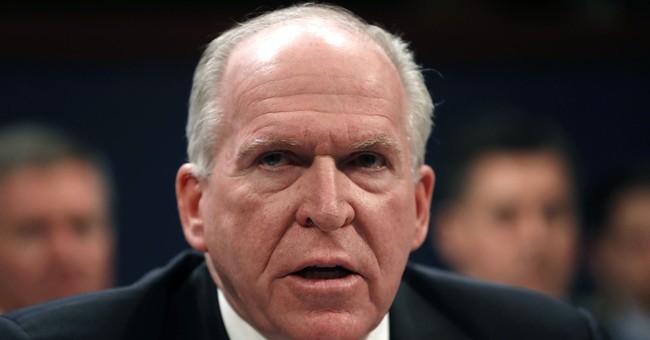'Unprecedented:' Why John Brennan's Extraordinary Partisanship Justifies Revoking His Security Clearance

President Trump's decision to strip former CIA Director John Brennan of his security clearance, announced yesterday, clearly lies within the president's authority. But was it the right thing to do? Officially, the White House says the move comes as a result of Brennan's 'erratic' behavior and history of dishonesty. Here's a portion of President Trump's statement on the matter -- which was originally dated late July, stirring speculation that the administration tactically released it yesterday to deflect from other news cycle items:
Historically, former heads of intelligence and law enforcement agencies have been allowed to retain access to classified information after their Government service so that they can consult with their successors regarding matters about which they may have special insights and as a professional courtesy. Neither of these justifications supports Mr. Brennan’s continued access to classified information. First, at this point in my Administration, any benefits that senior officials might glean from consultations with Mr. Brennan are now outweighed by the risks posed by his erratic conduct and behavior. Second, that conduct and behavior has tested and far exceeded the limits of any professional courtesy that may have been due to him. Mr. Brennan has a history that calls into question his objectivity and credibility.
More than a few people snarked that it's quite rich to see Donald Trump, of all people, warning that someone exhibiting "erratic conduct and behavior" shouldn't have access to classified materials. But Trump is the legitimately-elected President of the United States, accountable to the people. Figures like Brennan are accountable to elected civilian leadership. As for the alleged "history that calls into question [Brennan's] objectivity and credibility," Trump has a point. Several, actually. A few months back, Victor Davis Hanson ran through a number of Brennan's most serious credibility-destroying misadventures:
{1) In 2011, Brennan, then the country’s chief counterterrorism adviser, had sworn to Congress that scores of drones strikes abroad had not killed a single noncombatant — at a time when both the president and the CIA were both receiving numerous reports of civilian collateral deaths.(2) In 2014, John Brennan, now as CIA director, lied emphatically that the CIA had not illegally accessed the computers of U.S. Senate stafferswho were then exploring a CIA role in torturing detainees...Brennan’s chronic deceptions drew the ire of a number of liberal senators, some of whom echoed the Washington Post’s call for his immediate resignation. After months of prevarications, but only upon release of the CIA inspector general’s report, Brennan apologized to the senators he had deceived.(3) Brennan, in May 2017, as an ex-CIA director, again almost certainly did not tell the truth to Congress when he testified in answer to Representative Trey Gowdy’s questions that he neither knew who had commissioned the Steele dossier nor had the CIA relied on its contents for any action. Yet both the retired National Security Agency director, Michael Rogers, and the former director of National Intelligence, James Clapper, have conceded that the Steele dossier — along with the knowledge that it was a Clinton-campaign-funded product — most certainly did help shape the Obama’s intelligence communality interagency assessments and actions, often under the urging of Brennan himself.
There are also numerous reports that, despite his denials about knowledge of the dossier, Brennan served as a stealthy conduit to ensure that it was disseminated widely, at least in the sense of meeting in August 2016 with Senator Harry Reid to brief the senator about its unverified contents in hopes that he would pressure the FBI to further its investigations, which Reid did in a call two days later to James Comey.
In addition to these examples of documented dishonesty, it's important to consider Brennan's astonishing hyper-partisanship and "resistance"-style histrionics, both in televised commentaries and on social media. Two representative examples, starting with a blistering tweet sent in response to the firing of ex-FBI official Andrew McCabe (who, I'll remind you, repeatedly lied to federal investigators, prompting the Inspector General to recommend criminal charges):

No comments:
Post a Comment
Thanks for commenting. Your comments are needed for helping to improve the discussion.